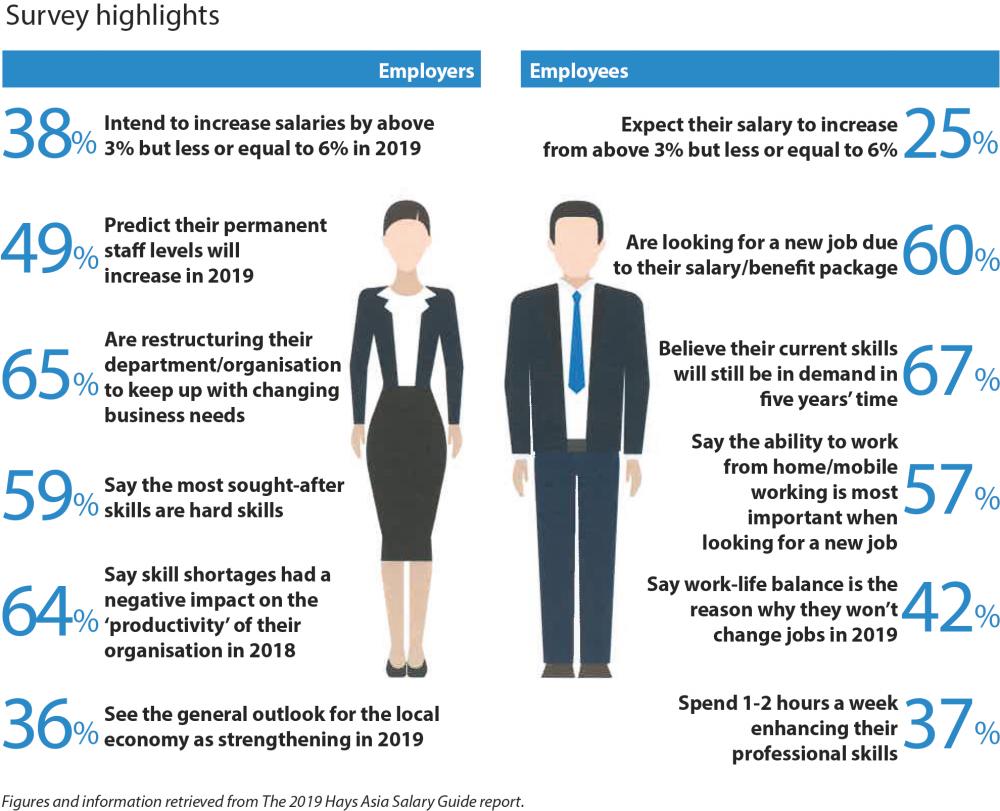IN March, Hays Malaysia held an event to launch “The 2019 Hays Asia Salary Guide”. Over 400 guests, comprising CEOs and senior HR professionals across industries, converged at The Westin Kuala Lumpur. There were four speakers who addressed the crowd, one of whom included Institute of Democracy and Economic Affairs (IDEAS) CEO, Ali Salman, who spoke on the Malaysia Economic Outlook.
“Given the momentous political change that Malaysia has gone through last year, the economic policy discussions have taken a back seat for now, which has led to a decrease in business confidence. However, as economic fundamentals remain strong, economic growth is stable, surplus capital is available, and with institutional reforms in progress, the economic outlook will improve in the medium to long term,” he shared.
Another speaker who engaged the audience was Human Inc CEO, Christoffer Erichsen, who spoke on “Designing a Culture of Connection and Delight for the Future Organisation”. He said that although many companies use buzz words like “disruption” and “innovation”, only a few are on the actual journey of real transformation. “We at Human Inc believe that empowerment and focus on culture, co-creation, creativity and capability driven by HR, are the building blocks to affect the change needed to stay relevant for the future,” said Erichsen.
In a nutshell, the report revealed that employers are, on the whole, positive about the business outlook and salary increments are likely amid the shortage of skills in Malaysia. Other important information gleaned from the analysis is the increase in business activity; the rise in employment of permanent staff; and the increase in wages, but by just three to six percent more.
On salaries, although sentiments were positive in this area, Hays Malaysia managing director Tom Osborne, felt there was room for improvement, which we’re sure many employees would agree on that.
“With more and more employees leaving, mostly due to the allure of better salaries or benefit packages, companies looking to retain valuable employees should work on improving satisfaction rates where remuneration is concerned,” he explained.
A brief look into benefits and bonuses showed a dip as the number of companies guaranteeing bonuses to all staff have reduced over the past year. Similarly, a decline is expected in the number of employers providing benefits and financial incentives.
On the shortage of skills, there is concern among employers that this will affect their operations, considering how productivity was hampered last year for many. Still, confidence was low in the ability to recruit skills required to meet organisational needs for 2019.
Interestingly, the report identified that Malaysia employers favour hard skills over soft skills. Through the survey, overall skills in demand were said to be:
* hard skills - statistical analysis, data mining, project management and computer skills; and
* soft skills - psychological competencies like problem-solving, teamwork and critical-thinking abilities.
Advice for employees to stay abreast
* Future-proof your position through up-skilling yourself. Take extra time to learn how technologies will affect your industry, develop yourself, undertake accreditations, and ensure your employer is aware of the new skills you obtained.
* Know your worth and ask for more. Only 36% of employees asked for increments last year; of these two thirds were successful. However, be prepared for rejection and have a back-up request like more annual leave, flexi working conditions, etc.
* Opportunities are out there - seek it out. Keep an eye on your company internal job boards, keep your CV and accreditations updated, attend networking events, make new contacts, and talk to recruitment specialists.
* Give the temporary and contract sector a try as this trend is slowly rising across Asia. Advantages are plenty as contracting gains you wider industry experience, allows you to make more new contacts and helps develop new skills.
* Perform for progression. If you want that career path, earn it. Take advantage of up-skilling opportunities and keep up-to-date with the requirements of your role. Maintain a record of your achievements and ensure the line makers and gate keepers in the company are aware of these.
Areas employers are urged to review and possibly revise
* Good work-life balance as in flexible working practices which employees deem important eg. home/mobile working; flexitime; etc.
* Consider making allowances for superlative talent as bonus structures and bonuses for all staff has dropped and where it has not, bonuses are becoming increasingly related to team performance. Here’s why - cited reasons for seeking new employment is improved salary and benefits.
* Retain ambitious employees with counter-offers as they will likely be the ones to explore their options. Talent retention should be foremost in mind but as not all company policies accept counter-offers, explore new challenges and clearer progression paths, which are high on employees’ lists for why they seek new roles.
* Improve, develop and promote talent within the organisation; this requires companies to train and upskill their employees.
* Broaden skills by diversifying your workforce. Diversity in the workplace is a major instigator of creativity and innovation.
Visit www.hays.com.my for more information.













